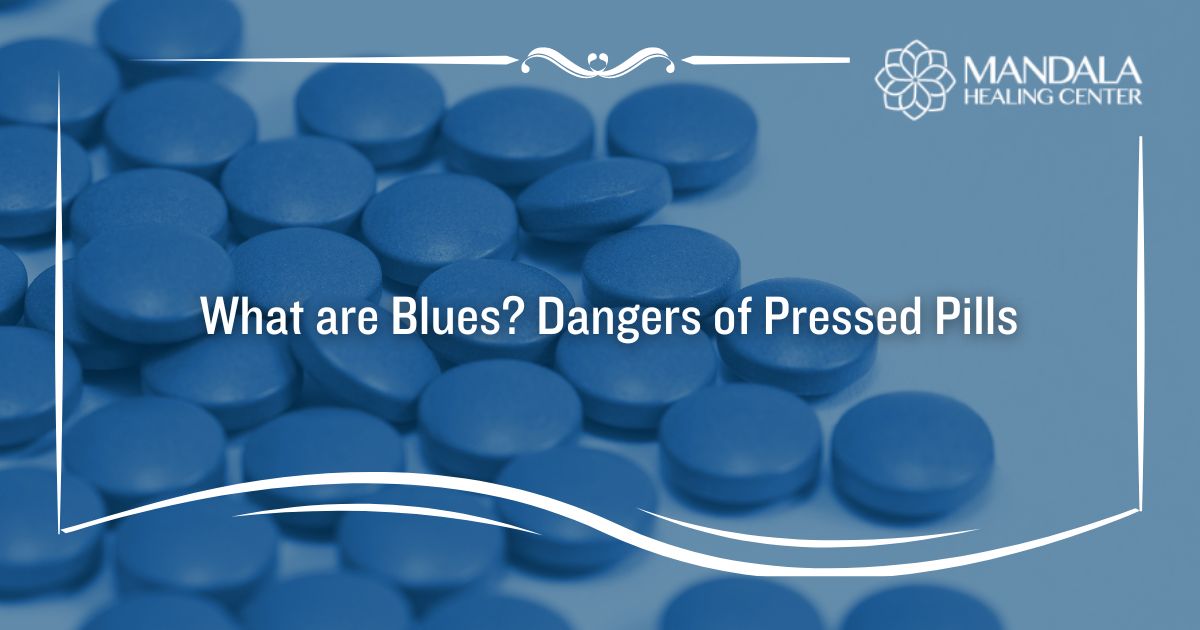Opioids are a class of drugs that depress the central nervous system and provide pain relief. While some opioids are used medicinally, they are known to be highly addictive. Unfortunately, many people buy fake pills from drug traffickers when they cannot get their hands on prescription opioids.
Opioid addiction continues to be a public health concern, claiming the lives of thousands of Americans each year. According to the National Institute on Drug Abuse (NIDA), 81,806 people died from opioid overdoses in 2022.[1]
One of the most commonly abused opioid drugs is referred to as “blues.” These are marketed as oxycodone pills, however, they are manufactured and pressed illegally. As a result, there is no way to tell what substances these pills contain without testing them.
The Drug Enforcement Administration (DEA) reports that blues or pressed m30s are counterfeit pills containing fentanyl.[2] This drug has increased the dangers of the opioid crisis, as even small amounts of fentanyl can lead to overdose deaths. If you or a loved one abuse counterfeit blues, it’s time to seek help from a drug rehab program like the Mandala Healing Center.
In this article, you will learn:
- What is the drug called “blues” or “m30s”
- Common street names for m30s
- What are the dangers of using pressed m30s
- Whether you can get addicted to fake oxycodone pills
What are Blues or M30s?
“Blues” and “m30s” are street names for blue oxycodone pills that people buy on the street. They believe they are receiving a 30mg pill of oxycodone. Unfortunately, even if there is oxycodone inside of the pill, it often contains other additives like fentanyl.
It is extremely dangerous to abuse blues or other counterfeit pills that you can buy in illegal drug markets. Whether you are buying them off of social media or on a street corner, they are not safe to consume in any manner.
The possible effects of blues or m30s include:[3]
- Pain relief
- Euphoria and feelings of well-being
- Dizziness and drowsiness
- Sedation
- Constipation
- Small, pinpointed pupils
- Slowed breathing and heart rate
- Itchy skin
People might use blues by swallowing the pills, snorting them, smoking them, or injecting them. While any type of drug abuse is dangerous, injecting counterfeit prescription drugs increases your risk of overdosing.
If you abuse blues long-term, you will develop an addiction. It is important to note that using pressed m30s even once puts you at a significant risk of overdosing, as it often contains an unknown amount of fentanyl.
Common Street Names for Blues
There are many street names that may be associated with blues. M30s are often referred to by this name because they tend to have “30” printed on one side of the pill.
Other street names for blues or pressed oxycodone pills include:
- Roxies or Roxys
- Percs
- Hillbilly heroin
- Kickers
- Oxy or OCs
People use these street names to hide that they are speaking about drugs. If you hear someone you love using these terms, they could be abusing pressed oxycodone pills. Thankfully, drug rehab programs provide life-saving treatments like medical detox, evidence-based therapies, and relapse prevention planning.
Understanding the Danger of Pressed Blues
More often than not, blues contain fentanyl. They are manufactured in illegal drug labs and contain fentanyl for one of two reasons: the individual creating them is trying to increase their profit or the pills came in contact with fentanyl accidentally (cross-contamination).
Either way, consuming a pill that contains pressed fentanyl is highly dangerous. This substance is 50 times stronger than heroin and 100 times more potent than morphine.[4] Even a small amount of it could lead to a life-threatening overdose.
The signs and symptoms of a fentanyl overdose include:[5]
- Small and pinpointed pupils
- Pale and clammy skin
- Limpness of the body
- Unresponsiveness and not waking up
- Vomiting or gurgling noises
- Blue tint to lips and fingernails
- Breathing or heartbeat slows or stops
If you notice someone displaying the signs of a fentanyl overdose, call 911 immediately. You cannot get in trouble for drug possession in the case of an overdose. Additionally, if naloxone (Narcan) is available, administer it as soon as possible, as this medication can reverse fentanyl and other opioid overdoses.
Can You Get Addicted to Blues?
Blues or pressed opioid pills are highly addictive. Once you begin using them, you will experience feelings of euphoria and pleasure. If you continue to consume them, you might develop a tolerance and a physical dependence.
The main signs of a blues addiction include:
- Having a hard time controlling how much and how often you use them
- Wanting to quit using them but being unsuccessful
- Failing to meet responsibilities at home, school, or work
- Needing to increase your dose to experience the desired effect
- Experiencing cravings to use more blues
- Dealing with frequent overdoses
- Suffering from withdrawal symptoms when you stop using blues
If you or a loved one experiences the above-mentioned symptoms, it’s time to seek treatment for opioid addiction.
Find Help for Opioid Abuse and Addiction
Opioid addiction can be difficult to overcome, however, the Mandala Healing Center is here to help you. We offer evidence-based behavioral therapy, peer support, trauma-informed care, and relapse prevention planning. All of these tools and services will make it easier for you to achieve long-term sobriety.
Contact us today to learn more about our addiction treatment programs.
References:
- The National Institute on Drug Abuse (NIDA): Drug Overdose Death Rates
- The Drug Enforcement Administration (DEA): Counterfeit Pills
- Faculty of Pain Medicine: Side Effects of Opioids
- Texas Health and Human Services: Fentanyl: One Pill Kills
- UC Davis Health: Fentanyl facts, overdose signs to look for, and how you can help save a life












